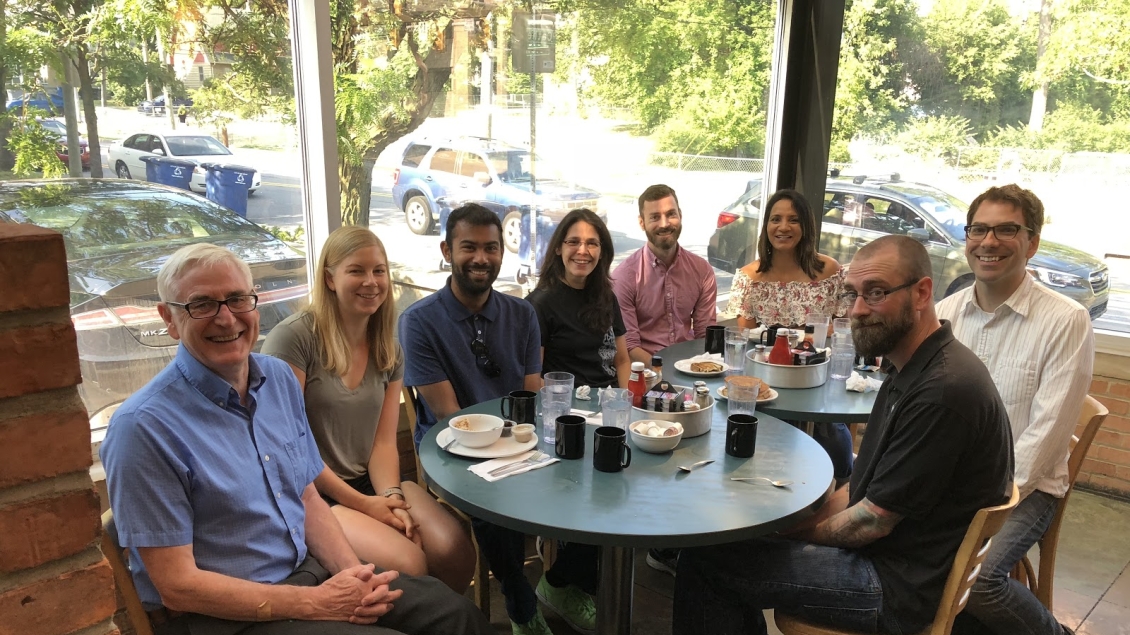
This postdoctoral training grant is located in a multidisciplinary setting in the Department of Pharmacology at the University of Michigan Medical School.
The training faculty are all NIDA grantees and have expertise in the neurobiology of substance abuse, with particular emphasis on the area of opioid and psychostimulant drugs.
The focus of this program is the training of PhD and MD postdoctoral fellows in state-of-the-art approaches for studying mechanisms underlying abuse of psychoactive drugs.
This includes studying the genetic, developmental and environmental factors that lead to vulnerability to substance abuse; the mode of action of drugs of abuse at the molecular, cellular, anatomical and behavioral levels; and the long-term consequences of psychoactive drugs on the brain and behavior, as mediated through mechanisms of neural plasticity.
The working assumption is that the functional and structural brain remodeling associated with chronic drug use lies at the basis of tolerance, sensitization, physical dependence, and psychological addiction to these drugs. The drug abuse research community at the University of Michigan is of high quality and has a long history in the field. Beyond their individual strengths, the training faculty members have long-term scientific and training relationships with each other.
These historical strengths have recently been significantly enhanced with a number of new initiatives at the University of Michigan designed to facilitate life sciences research in general, and neuroscience research in particular. They include state-of-the-art tools for mouse and rat genetics, genomics, proteomics, and informatics. Trainees also benefit from career and professional development opportunities provided by the Office of Graduate and Postdoctoral Studies, and the UM Postdoctoral Association. Thus, our trainees profit from a highly sophisticated, yet extremely supportive, research and training environment.
Interested in working with the Biology of Drug Abuse Training Program?
BDA Director
BDA Co-Director
Pharmacology Department and Domino Research Center
Biopsychology Area of the Psychology Department
Michigan Neuroscience Research Institute (MNI) and Psychiatry Department
Chemistry Department
Cell and Developmental Biology Department
Berent-Spillson, Alison
Research Assistant Professor, Dept. of Psychiatry, University of Michigan
Brim, Remy
Vice President, BGR Government Affairs
Klebaur, Jennifer
Instructor, Psychology, Central Piedmont Community College
Davis, Brooke
Research Liaison officer, Division of Research, U of Houston
Kollack-Walker, Sara
Sr Scientist Assoc, Eli Lilly
Love, Tiffany
Research Assistant Professor, Dept. of Psychiatry, University of Michigan
Mickey, Brian
Assistant Professor, Dept. of Psychiatry, University of Michigan
Paronis, Carol
Assistant Professor, Northeastern University
Qiu, Yunhai
Shenzhen Institutes of Advanced Technology, China
Ruzicka, Bianca
VP, Sci Comm, Helix Medical Comm
Shafir, Tal
MBNI, University of Michigan
Vivian, Jeffrey
Director, Neuroscience, Maccine Pharmaceuticals
Lagorio, Carla
Assistant Professor, Psychology, University of Wisconsin-Eau Claire
Soldo, Brandi
Staff Res Sci, Icagen, NC
Jimenez-Gomez, Corina
Assistant Professor, University of Florida, Gainesville
Norton, Camille
General Scientific Manager, Originus Inc
Pogozheva, Irina
Associate Res Prof, Coll of Pharmacy, UM
Briscoe, Richard
Safety Pharmacology, Merck
Owens-Vance, Constance
Sr Scientist, Endecea BioPharm Inc
Baird, Theodore
Res Sci (Behavior), MPI Research
Evans, Simon J
Assistant Professor, U of M Psychiatry
Hebda-Bauer, Elaine
Sr Research Specialist, MBNI, U of M
Bonner, Gregg
Sr Research Specialist, MBNI, U of M
Isgor, Ceylan
Associate Professor, Florida Atlantic University
Pratt-Hyatt, Matthew
Associate Laboratory Director at the Great Plains Laboratory, Inc.
Fantegrossi, William
Associate Professor, Arkansas U
Galuska, Chad
Associate Prof, Psychology, College of Charleston
Pletsch, Amy
Pritzker Consortium Agreement, UM
Venton, B. Jill
Associate Prof, Dept of Chemistry, U of Virginia
Jackson, Lisa
Professor, Psychology, Schoolcraft College, MI
Bradbury, Faye
Lecturer, Dept. Chemistry and Toxicology, U of M Dearborn
Talbot, Jeffery
Asso. Prof, Asst. Dean for Research, Dir., Research center on Substance Abuse & Depression, College of Pharmacy, Roseman U, Nevada
Wade-Galuska, Tammy
Asst. Prof, U South Carolina Salkehatchie
Fentress, Hugh
Asst. Prof, Biology, Fisk U; Adj. Asst. Prof, Pharmacology, Vanderbilt
Kim, Myungnyun
U of M
Jutkiewicz, Emily
Associate Professor, Dept. of Pharmacology, UM
Turner, Cortney
Res. Investigator, Pritzker Consortium, MBNI
Berent-Spillson, Alison
Res. Investigator, Psychiatry, UM
Anantharam, Arun
Associate Professor, University of Toledo
Divin, Mary
Lecturer, Dept Chemistry and Biochemistry, California State U, East Bay
Meyer, Paul
Assistant Professor, Psychology, University of Buffalo
Podlesnik, Christopher
Associate Professor, Behavioral Analysis, Florida Tech
Mabrock, Omar
Senior Scientist, Biogen, MA
Perry, Adam
Research Assistant Professor, Psychology, UT El Paso
Ahrens, Allison
Research Fellow, Psychology, U of M
Bertz, Jeremiah
Postdoctoral Fellow, NIDA Intramural Program, Baltimore
Cope, Lora
Research Fellow, Psychiatry, UM (PTSP)
Aydin-Grant, Cigdem
Research Fellow, Molecular and Behavioral Neuroscience Institute
Parsegian, Aram
Research Fellow, Molecular and Behavioral Neuroscience Institute
Singer, Bryan
Assistant Professor, Neuroscience, Open University, UK
Hillhouse, Todd
Assistant Professor, Psychology, University of Wisconsin, Green Bay
Zestos, Alex
Assistant Professor, Chemistry, America University, Washington DC
Nesbitt, Kathryn
Assistant Professor, Chemistry/Biochemistry, Towson University, MD
Kerver, Halie
Assistant Professor, Michigan State University
Oginsky, Max
Postdoctoral Fellow, Molecular, Cellular and Developmental Biology, UM
Kandasamy, Ram
Assistant Professor of Psychology, California State University, East Bay
Rivero Covelo, Ignacio
Assistant Professor, University of Wisconsin - Parkside
Gritton, Howard
Assistant Professor, University of Illinois - Champaign